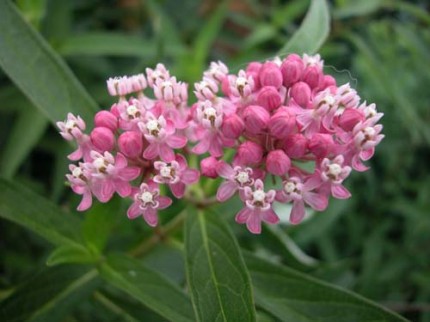OMAFRA Initiative Supports Monarch Butterfly Pollinator Health
Posted: August 27, 2014
Categories: GoodFoodBites / News from Sustain Ontario

Swamp milkweed. Credit: MonarchWatch.org.
This past spring, the Ministry of Agriculture and Food passed a proposal to remove milkweed (Asclepias spp.) from the Schedule of Noxious Weeds, which had required the destruction of this important monarch butterfly habitat and larval food source on croplands. We’ve sent a letter to congratulate the Ministry on this initiative to support the restoration of the continental monarch butterfly population.
In 2013, monarchs experienced one of the worst years in history due to a number of factors along their extensive migration route from Canada to Mexico. Milkweed’s steep decline has something to do with it: a study led by Tyler Flockhart, a conservation biologist at the University of Guelph, calculated a 21% loss of milkweed stems in eastern North America from 1993-2005.[1]
We are hopeful that this trend will be reversed by the Ministry’s action to reduce factors that are jeopardizing these pollinators’ longevity and the ability to maintain healthy food and farming systems. OMAFRA’s action has been shared as a model step forward for government in the US-based TakePart digital magazine.
Removing milkweed from the noxious weeds list supports conservation efforts in Ontario such as widespread planting of milkweed over large landscapes, including urban areas, to offset the ongoing loss of milkweed/monarch habitat across the continent. For examples, see Monarch Watch and the David Suzuki Foundation.
Special mention to Anne Bell and member Ontario Nature for their leadership on providing research for this letter and reaching out to the community to build energy round this initiative. See their Action Alert page.
[1] See TakePart article by Hannah Hoag, http://www.takepart.com/article/2014/07/30/monarch-butterfly-numbers-are-plummeting-and-heres-what-you-can-do-help
One response to “OMAFRA Initiative Supports Monarch Butterfly Pollinator Health”
Leave a Reply
You must be logged in to post a comment.

[…] OMAFRA Initiative Supports Monarch Butterfly Pollinator Health (August 27, 2014) […]